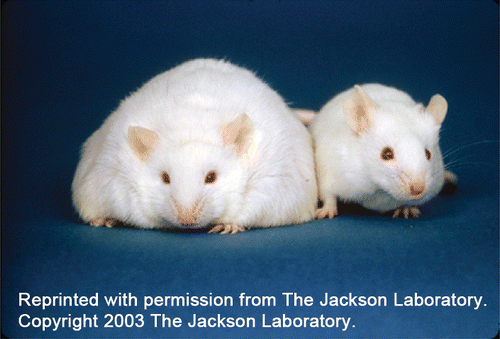All-they-can-eat diet for lab mice and rats may foster inaccurate test results

The widespread practice of allowing laboratory rats and mice to eat as much as they want may be affecting the outcome of experiments in which scientists use these "test-tubes-on-four-feet" to test new drugs and other substances for toxicity and other effects. That's the conclusion of a new analysis published in ACS' journal Chemical Research in Toxicology.
Laboratory mice and rats serve as stand-ins for people for research that cannot be done on humans. In the article, Gale Carey and Lisa Merrill point out that the millions of lab rodents used in laboratory studies each year have a nutritional status that is different from other test animals. While other test animals are fed meals, rodents have round-the-clock access to food. And eat they do, gaining more weight and more body fat than meal-fed rodents. The authors cite other research indicating that lab rodents with free access to food tend to develop abnormally high blood fat levels, high cholesterol, nerve and heart damage, cancer and other disorders.
Their analysis of 54 studies concluded that having free access to food is likely to affect the results of tests for the toxicity and cancer-causing effects of new drugs and other substances in rodents, and could be the reason why such studies have been varying so much in recent years. "Therefore, it is crucial that feeding regimen be carefully considered in designing toxicology experiments," say the authors.
More information: Meal-Feeding Rodents and Toxicology Research, Chem. Res. Toxicol., Article ASAP. DOI: 10.1021/tx300109x
Abstract
Most laboratory rodents used for toxicology studies are fed ad libitum, with unlimited access to food. As a result, ad libitum-fed rodents tend to overeat. Research demonstrates that ad libitum-fed rodents are physiologically and metabolically different from rodents fed controlled amounts of food at scheduled times (meal-fed). Ad libitum-fed rodents can develop hypertriglyceridemia, hypercholesterolemia, diet-induced obesity, nephropathy, cardiomyopathy, and pituitary, pancreatic, adrenal, and thyroid tumors, conditions likely to affect the results of toxicology research studies. In contrast, meal-feeding synchronizes biological rhythms and leads to a longer life span, lower body weight, lower body temperature, hypertrophy of the small intestine, and synchronization of hepatic and digestive enzymes. The circadian rhythms present in nearly all living organisms are entrained by light intensity and food intake, and peripheral clocks in all organs of the body, especially the GI tract and liver, are particularly sensitive to food intake. Feeding schedule has been demonstrated to alter the toxicity and metabolism of drugs including sodium valproate, chloral hydrate, acetaminophen, gentamicin, and methotrexate. Feeding schedule alters the expression of genes that code for Phase I, II, and III proteins, thereby altering the rate and amplitude of drug disposition. Rhythms of plasma insulin and glucagon that fluctuate with food ingestion are also altered by feeding schedule; ad libitum feeding promotes hyperinsulinemia which is a precursor for developing diabetes. The emerging field of chronopharmacology, the interaction of biological rhythms and drugs, will lead to optimizing the design and delivery of drugs in a manner that matches biological rhythms, but it is wise for toxicology researchers to consider feeding schedule when designing these experiments. It has been 10 years since the Society for Toxicologic Pathology voiced its position that feeding schedule is an important variable that should be controlled in toxicology experiments, and research continues to underscore this position.
















